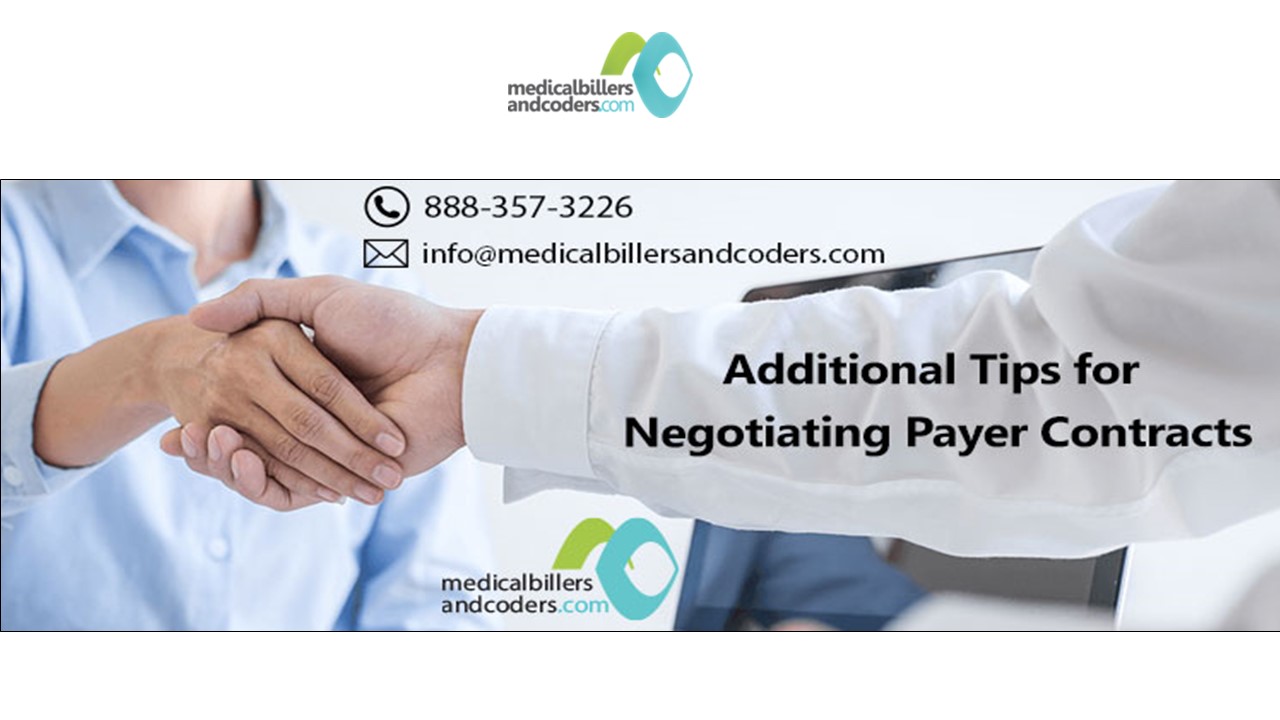Additional Tips for Negotiating Payer Contracts - PowerPoint PPT Presentation
Title:
Additional Tips for Negotiating Payer Contracts
Description:
Negotiating payer contracts is possible for those are willing to craft a thoughtful, data-driven argument for why they deserve more money. Negotiating payer contractors is often an overlooked option of revenue generation. – PowerPoint PPT presentation
Number of Views:1
Title: Additional Tips for Negotiating Payer Contracts
1
(No Transcript)
2
Additional Tips for Negotiating Payer Contracts
Many physicians struggle with fee-for-service
payer contract negotiations because asking for
higher payments can feel like a pointless effort.
Negotiating a successful payer contract is
possible for those willing to craft a thoughtful,
data-driven argument for why they deserve more
money. Physicians think it will be really
stressful or may not yield any results.
Negotiating payer contractors is often
an overlooked option for revenue generation.
Reviewing your payer contracts and negotiating
them from time to time could ensure the long-term
financial sustainability of your practice. In our
previous articles, we already have discussed
basic guidelines and tips for negotiating payer
contracts. In this article, we have discussed
additional tips for the same. Additional Tips
for Negotiating Payer Contracts Make a
list Target the payers you want to prioritize.
Before spending any time trying to contact payers
youll want to work to identify your top 5-10
payers first. This list would be a good point to
start. Create a connection with a payer
3
Additional Tips for Negotiating Payer Contracts
Once you have identified your top payers, its
time to connect with a person directly regarding
your contract. Communicating with a live person
is critical to creating a relationship with your
payer where you can build rapport and trust. In
turn, this relationship will result in an
allyship once it is time for contract
negotiations. Begin with calling someone in
credentialing, provider enrollment, or network
management department. Calls in these departments
will likely lead to a conversation with someone
who can lead you to the most relevant rep to
discuss contracts. Get the current fee
schedule The preferred way to get current
contact information is by getting an original
copy of the fee schedule from the payer. Keep in
mind that this can take up to 30 days to obtain
from calling/portals. You can also gather this
information by looking at the claims history. The
downside with this method is that there are
adjustments, depending on modifiers and multiple
procedures that could impact your allowable from
claims. Find out your value in the
network Know your ratings on Google, review
platforms like RateMDs and ZocDoc, and work to
differentiate yourself and bring added value to
the payer network. What do you do that the payer
would appreciate, outside of
4
Additional Tips for Negotiating Payer Contracts
how big you are or the revenue you generate? Do
you keep people out of the ER? Do you have office
hours that patients appreciate? Work to build
added value. Develop a relationship with
payers Develop a plan to initiate regular
contact with your payers. Believe it or not, your
payers want to hear from you. They want to know
what youre doing to improve the quality of your
care, drive value for members, and reduce costs
so they can funnel more patients to high-value
practices. If you only approach payers during the
negotiation process or when you have issues, you
risk seeming self-interested and like you only
care about increasing reimbursement rates. And,
while its true that you do care about increasing
reimbursements, its important to establish trust
and nurture payer relationships as a
mutually-beneficial partnership. All payers are
not equal The approach you take to obtain
contracts successfully for one payer may not work
for others, so its important that you validate
your process. Are you collecting contracts? Are
you negotiating? Different payers have different
channels, and understanding the best one for each
payer is key. As you get more familiar with
working with payers, you will begin to see
patterns and trends that will make you more
effective.
5
Additional Tips for Negotiating Payer Contracts
Contracting for different networks Many times
payer contracts can cover more than one network
i.e., commercial (PPO, HMO, POS), Medicare
Advantage, and Managed Care (Medicaid). As a
result, its important that you make yourself
aware of how the payer operates with those
products. Each payer will treat these contracts
differently, so becoming familiar with the
language used will be helpful in navigating these
contracts. For example, one major payer might
have a blanket contract that is in compliance
with CMS guidelines, while another major payer
has a contract section for commercial payers that
overrides Medicare Advantage patients. Medical
Billers and Coders (MBC) is a leading medical
billing company providing complete revenue cycle
services. We assist healthcare practices in
getting credentialed and reviewing payer
contracts with the ultimate aim to boost practice
collections. If you are looking for any
assistance in provider credentialing/enrolment or
payer contracts, email us at info_at_medicalbillersa
ndcoders.com or call us at 888-357-3226.































